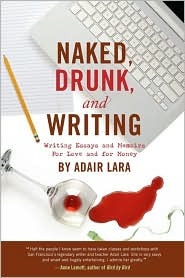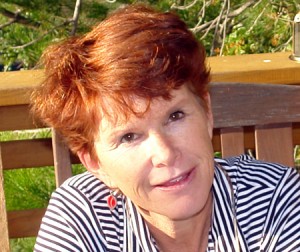
Read also “5 Tips on Writing Creative Nonfiction from Author Adair Lara.”
It was a pleasure to welcome Adair Lara as guest author for the spring 2012 session of my online course Memories into Story: Introduction to Life Writing (University of Toronto in partnership with the New York Times Knowledge Network). Adair is the San Francisco–based author of the memoir Hold Me Close, Let Me Go, and of the memorably titled Naked, Drunk and Writing: Shed Your Inhibitions and Craft a Compelling Memoir.
Following are more of her thoughtful answers to my students’ interview questions.
On writing your own truth …
What people remember has less to do with what actually happened than with who they are, what they’re afraid of. I was pretty old, for example, before I realized I had a lousy childhood. My older sister Connie was the one who clued me in. I had gone to see her in Portland, and her friends, aging blondes clicking white wineglasses, all looked at me with that exaggerated tenderness women get in their faces when they’ve heard of your troubles. “We’ve heard a lot about your childhood,” one said, and then looked around for a chair for me, as if that childhood had left me too weak to find one for myself. They’d been told we were beaten every day and fed on crusts of bread.
I remember growing up laughing at the table, and a sunlit yard, and a mother who was always home. Connie seemed to have grown up in a Dickens novel. Which version is true? I think you get to choose how to remember things, just as you get to choose how to think about things happening in your life right now.
On altering details to protect others …
You get to tell your own stories, but sometimes other people are in them. If you can, you change identifying details and names — you can even change the gender of someone if gender is not a factor and you don’t want them to recognize themselves. This is harder when talking about relatives (“My father, I’ll call him Ned …”)…. In Hold Me Close I had to change the name of Morgan’s boyfriend — and that killed me, because his real name was Rip. So perfect! I couldn’t change Morgan’s name, of course.
On writing about family …
 In my experience people get over it, even if they are irritated at first at being written about. In a good piece, you the author will be the one portrayed as screwing up, so that should take the pressure off.
In my experience people get over it, even if they are irritated at first at being written about. In a good piece, you the author will be the one portrayed as screwing up, so that should take the pressure off.
On the other hand, if you love them and don’t want to hurt them, write about something else.
Be especially careful writing about your kids after, say, age ten. I wish I had not published Hold Me Close, about my daughter’s adolescence. She was fine with it, but I think now that I had no right to do that.
If you can, show your writing to people mentioned and get it okayed before publication. I never let my parents read anything beforehand, though. My mother would say airily, “Oh, I don’t think so, Dare,” and there would go a whole book.
On when to hire a book coach or editor …
Right at the beginning! Saves you from going down so many wrong roads. Of all the things that have happened to you, writing a memoir compels you to select just certain events, and arrange them in the shape of a meaningful story. Hard for someone inside that life to do: to see what the story needs. A coach or editor will tell you that the story of how your little sister died gets to go in the story of your closeted gay dad only if it affects that story. The story of losing the family winery in a lawsuit may not get into the story of being a wine consultant on a cruise ship.
I wish I had consulted a coach early on with Hold Me Close. Would have saved me years of writing stuff that wasn’t part of the story. Right now I’m fiddling with writing children’s books, and when I have a stack of first drafts my plan is to hire a children’s book editor or agent to go over them with me.
On being a writer …
I’d advise new writers not to think they can just command themselves to sit down and write and write and write, and ignore that they sometimes feel discouraged, or too busy, or unsure what to do with the writing once they’re done. They should find ways to bring in other people — teachers, fellow students, writing partners or groups.
Someone else must care whether or not they wrote that day. And they need a little praise now and then.
As for whether writers can be “made” — if you want to be a writer, and you can put one word down, then another and another, then you are one.
* * *
 ADAIR LARA is a writer, teacher and author in San Francisco. A former magazine editor, she wrote a popular, award-winning personal column for the San Francisco Chronicle for 12 years before leaving the paper to write and teach full time. Her most recent book ,which has become a cult favourite in the writing blogsphere, is Naked, Drunk and Writing: Shed Your Inhibitions and Craft a Compelling Memoir or Personal Essays (Ten Speed). She holds sold-out workshops in her house on writing essay and memoir and other forms of autobiography, and consults with authors individually, in person or long-distance. Her essays appear in many national magazines, and have been anthologized in dozens of textbooks. She writes a monthly column for Grandparents.com.
ADAIR LARA is a writer, teacher and author in San Francisco. A former magazine editor, she wrote a popular, award-winning personal column for the San Francisco Chronicle for 12 years before leaving the paper to write and teach full time. Her most recent book ,which has become a cult favourite in the writing blogsphere, is Naked, Drunk and Writing: Shed Your Inhibitions and Craft a Compelling Memoir or Personal Essays (Ten Speed). She holds sold-out workshops in her house on writing essay and memoir and other forms of autobiography, and consults with authors individually, in person or long-distance. Her essays appear in many national magazines, and have been anthologized in dozens of textbooks. She writes a monthly column for Grandparents.com.